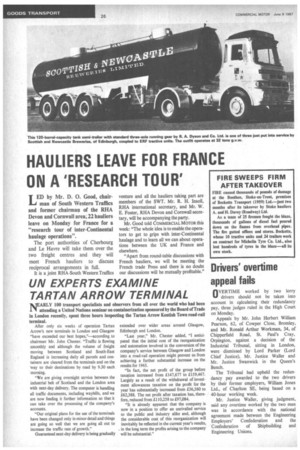UN EXPERTS EXAMINE TARTAN ARROW TERMINAL
Page 28

If you've noticed an error in this article please click here to report it so we can fix it.
NEARLY 100 transport specialists and observers from all over the world who had been attending a United Nations seminar on containerization sponsored by the Board of Trade in London recently, spent three hours inspecting the Tartan Arrow Kentish Town road-rail terminal.
After only six weeks of operation Tartan Arrow's new terminals in London and Glasgow "have exceeded our best hopes,"—according to chairman Mr. John Chester. "Traffic is flowing smoothly and although the volume of freight moving between Scotland and South-East England is increasing daily all parcels and containers are cleared from the terminals and on the way to their destinations by road by 9.30 each morning.
-We are giving overnight service between the industrial belt of Scotland and the London area with next-day delivery. The computer is handling all traffic documents, including waybills, and we are now feeding it further information so that it can take over the processing of the company's accounts.
"Our original plans for the use of the terminals have been changed only in minor detail and things are going so well that we are going all out to increase the traffic rate of growth."
Guaranteed next-day delivery is being gradually extended over wider areas around Glasgow, Edinburgh and London.
"Last year," Mr. Chester added, "I anticipated that the initial cost of the reorganization and automation involved in the conversion of the company's service between Glasgow and London into a road-rail operation might prevent us from achieving a further substantial increase on the results for 1965.
"In fact, the net profit of the group before taxation increased from £147,677 to £159,467. Largely as a result of the withdrawal of investment allowances taxation on the profit for the year has substantially increased from £36,560 to £62,388. The net profit after taxation has, therefore, reduced from £110,258 to £97,084.
"It is already apparent that the company is now in a position to offer an unrivalled service to the public and industry alike and, although the considerable cost of this reorganization will inevitably be reflected in the current year's results, . in the long term the profits arising to the company will be substantial."




























































































































